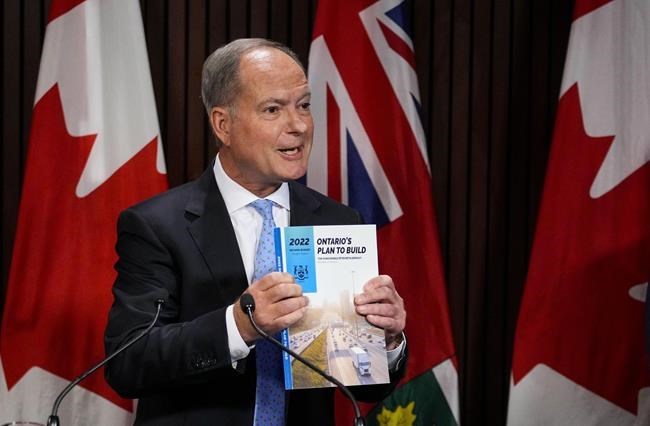TORONTO — Ontario is projecting improving deficits over the next couple of years despite an expected economic slowdown, but opposition critics say Monday's fall economic statement fails to "meet the moment" as it lacks new injections of health spending.
The province's fall economic outlook forecasts a deficit of $12.9 billion in this fiscal year, followed by $8.1 billion the following year and a deficit of just $700 million in 2024-25. Finance Minister Peter Bethlenfalvy wouldn't commit to balancing the budget the following year, saying he's "optimistic" about the province's finances, but doesn't have a crystal ball. Â
Bethlenfalvy said eliminating the deficit is a "critical part" of the government’s long-term vision for the province.
"After unprecedented spending in response to the pandemic, now is the time for governments to show restraint, to act cautiously and responsibly," he said in the legislature.
"Irresponsible spending today will only make inflation more painful and drag out an economic downturn."
But Ontario's opposition parties said now is the time to spend more on health and other services given that pediatric ICUs are full, hospitals are struggling to staff emergency rooms and communities are seeing increasing instances of zero ambulances being available at times.
"The fall economic statement fails to meet the moment in time we're facing in Ontario," said Green Party Leader Mike Schreiner.Â
"You would never know we’re facing a health-care crisis, a homelessness crisis, the fact that we’re forcing people on (the Ontario Disability Support Program) to live in legislated poverty, that we’re in a climate crisis."
Monday's mini budget contains changes to allow Ontario Disability Support Program recipients to keep more of their earnings, but still leaves people who are unable to work at all living on $1,228 a month for basic needs and shelter.
The government is seeking to increase the monthly earnings exemption for people on ODSP from $200 to $1,000 per month. Above that amount, people on ODSP could keep 25 cents on the dollar. It could encourage up to 25,000 more people to participate in the workforce, the government said.
In the budget earlier this year, the government increased ODSP rates by five per cent, and the fall economic statement would enact a previous promise to index future increases to inflation. Advocates have said the amounts still leave people unable to pay for basic needs.
The NDP said there should have been more money for affordability measures, such as expanding rent control, helping people to reduce home heating bills and affordable housing, not to mention health care.
"They sit on billions amid a health-care crisis," said NDP finance critic Catherine Fife. "This government has not allocated a single new penny."
Bethlenfalvy said this year's budget poured billions into health care.
Other affordability measures in the fall economic statement include extending a 5.7-cent gas tax cut to the end of 2023, which Premier Doug Ford announced Sunday, and doubling payments to low-income seniors.
The government proposes to double the Guaranteed Annual Income System payment for a year starting in January. The maximum payment for single seniors would be $166 per month and $332 per month for couples. The government is also indicating it is working on expanding eligibility for the payments.
The year ahead will be a difficult one, Bethlenfalvy said, predicting economic turbulence. Ontario's real GDP growth is pegged for next year at just 0.5 per cent, down sharply from 2.6 per cent this year.Â
Ministry of Finance officials say there is a high degree of economic uncertainty, and under a faster economic growth scenario Ontario could see a $9.2-billion surplus in 2024-25, while under a slower growth scenario, the deficit that year could be $8.5 billion.
Monday's projections came after Bethlenfalvy announced in September that the province ended the 2021-22 fiscal year with a $2.1-billion surplus, a far cry from the $33-billion deficit projected in the previous budget.Â
Government officials say a nearly $7-billion improvement in this year's $19.9-billion deficit from the spring budget is largely due to higher nominal GDP and inflation.
But opposition critics say it's due to accounting, projecting deficits in order to justify austerity.
"They're trying to act as if they don't have the money when in fact they do," said Liberal finance critic Stephanie Bowman. "They’re squirrelling away this money — in their words — to be flexible. The health-care crisis that we’re experiencing is exactly the time that they should be flexible with their budget and spend money."
The province is also proposing to launch a voluntary clean energy credit registry for businesses.
Companies that have commitments to use 100 per cent clean or renewable energy could use the credits to show their electricity has been sourced from clean resources such as hydroelectric, solar, wind, bioenergy and nuclear power, the government said. Revenue "could be" returned to ratepayers, help lower electricity costs or support more clean energy generation.
As well, the government is proposing tax changes that would allow about 5,500 more businesses to use the small business corporate income tax rate. It is currently subject to a limit of $500,000 of income that phases out between $10 million and $15 million of taxable capital and the government proposes to raise that phase out to between $10 million and $50 million.
The change would give businesses $185 million in income tax relief over three years, the government said.
This report by The Canadian Press was first published Nov. 14, 2022.
Allison Jones, The Canadian Press




